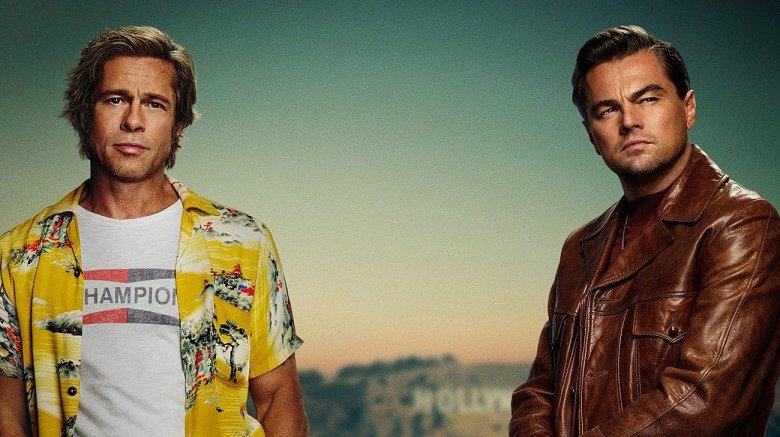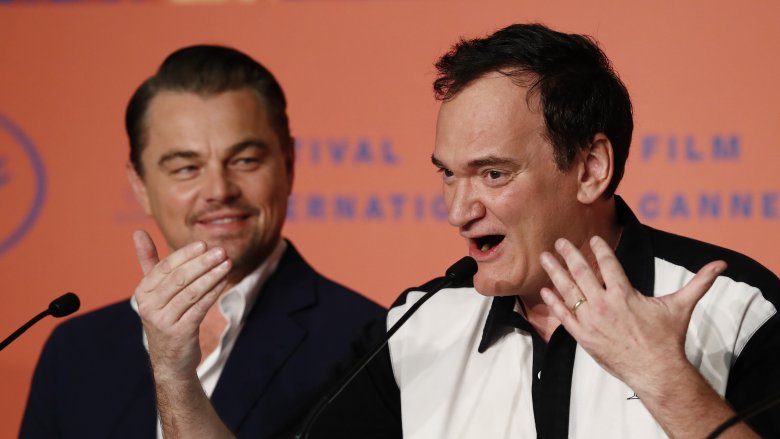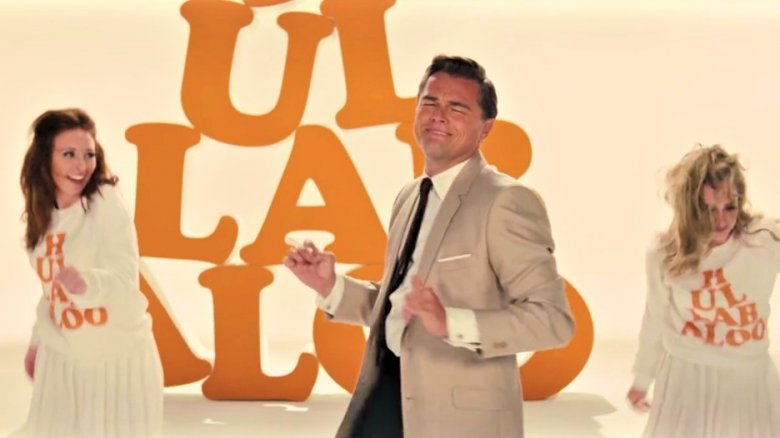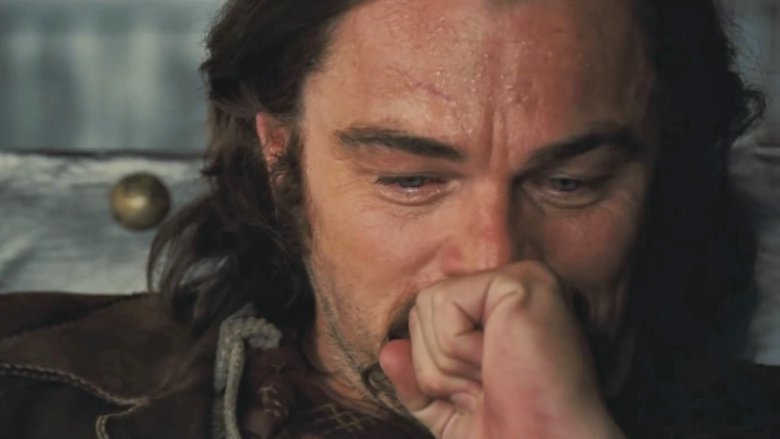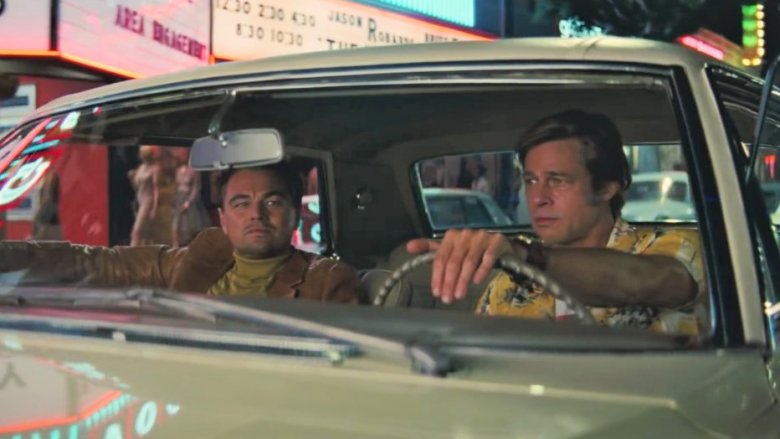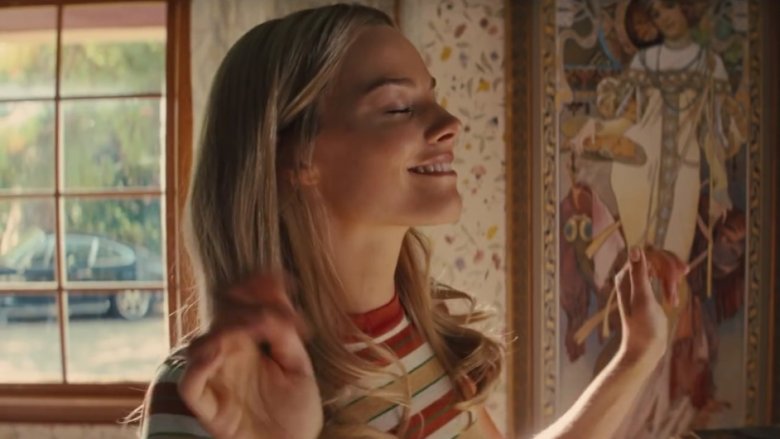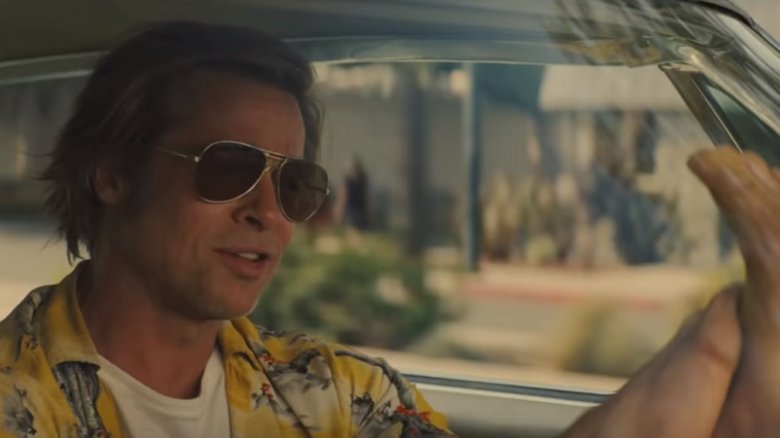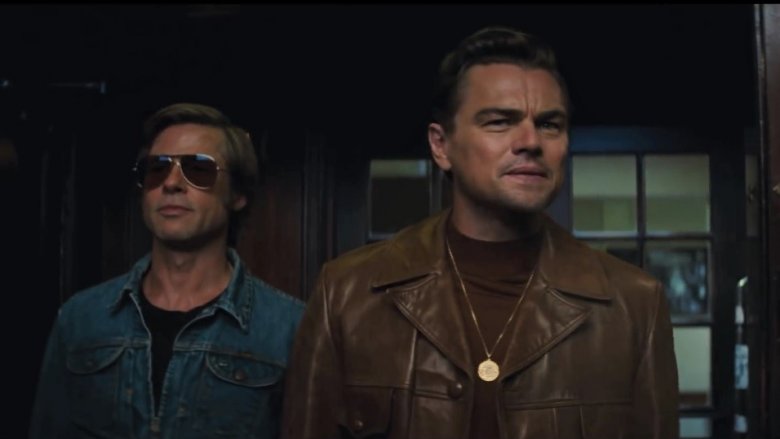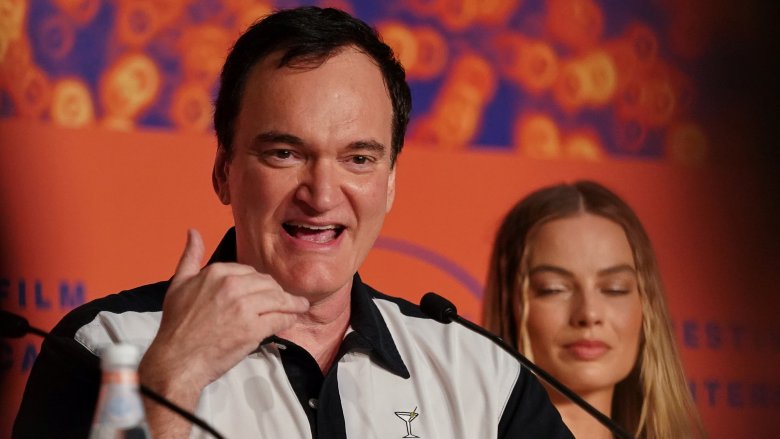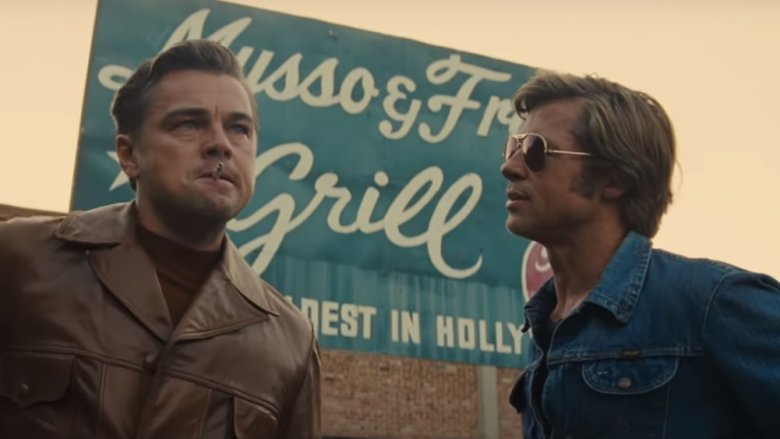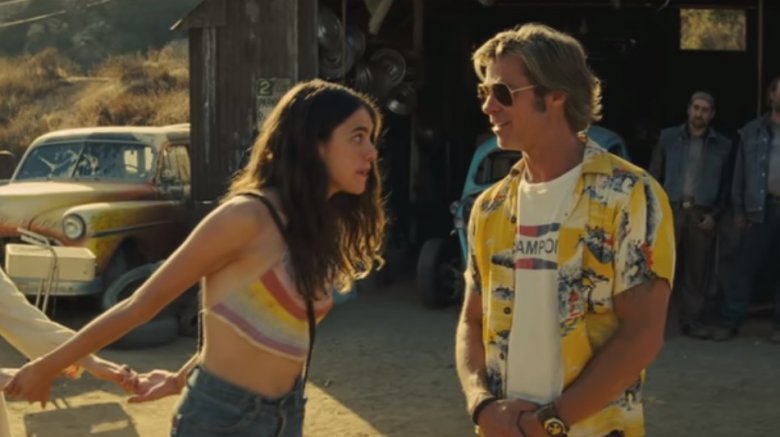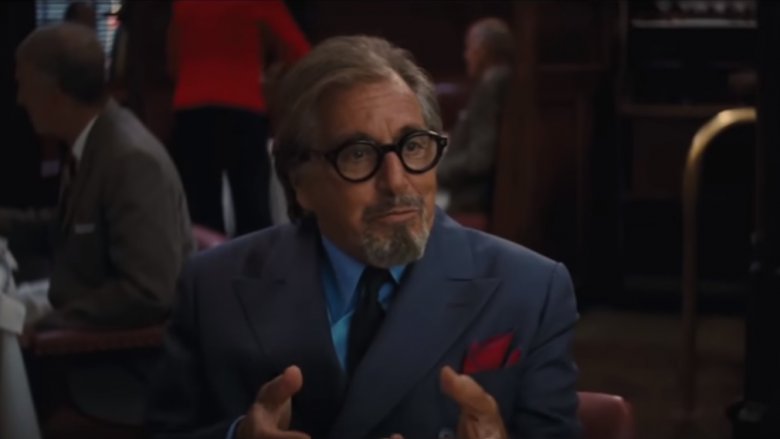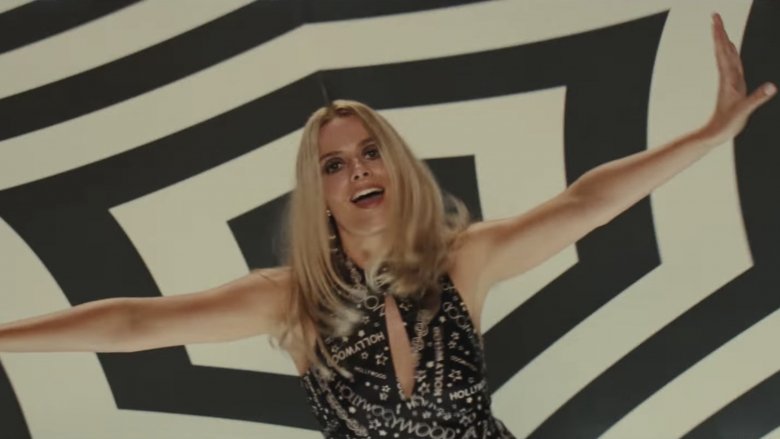What The Critics Are Saying About Once Upon A Time In Hollywood
For decades now, a new Quentin Tarantino film has been a real event in Hollywood. Once every few years, the movie world goes nuts over the cult director's latest offering, wondering just what he'll bring to the table this time around. Because Tarantino's ninth film is all about Tinseltown during a time of great change, the industry buzz has been particularly palpable this time around. The question is, how does Once Upon a Time in Hollywood measure up against the director's previous work?
Set in 1969, the movie takes place around the time of the Manson Family Murders, but Charles Manson and his followers aren't the main focus here. The viewer experiences '60s Los Angeles via struggling movie star Rick Dalton (Leonardo DiCaprio) and his laid back stunt double, Cliff Booth (Brad Pitt). Rick and Cliff's path eventually crosses with that of the "Manson girls," culminating in a typically Tarantino finale. When the film premiered at Cannes in 2019 (25 years to the day after Tarantino debuted Palme d'Or winner Pulp Fiction), the director urged those in attendance not to spoil the ending, and — for the most part — the critics have honored that. It's not hard to read between the lines, however, and it's already becoming clear that certain parts of Once Upon a Time in Hollywood are going to split the public opinion. Here's what the critics have been saying about it.
Tarantino shows his affectionate side
Tarantino spent much of his childhood in and around Los Angeles county, and he shows his love for that time period in a big way with Once Upon a Time in Hollywood. "If you didn't know already, Tarantino loves Hollywood which is why this film is the ultimate love letter from him," Collider's Gregory Ellwood said. According to Time film critic Stephanie Zacharek, the director is "at his best when he's motivated by affection," and that ultimately shines though in his latest feature. "Once Upon a Time in Hollywood ranks among his finest; the serrated bitterness of his last picture, The Hateful Eight, has vanished," Zacharek said in her review. "This is a tender, rapturous film, both joyous and melancholy, a reverie for a lost past and a door that opens to myriad imagined possibilities."
Esquire's Michael Hainey puts this slight mellowing of the director's approach down to his age as much as anything else. "For the first time you see Tarantino — perhaps because of where he is in his own life, a man in his fifties — bringing unexpected, deep, rich feelings to his film and to his characters," Hainey wrote in his glowing review of the '60s-set character flick. "You see Tarantino risking real, complex, emotions for his characters."
It's full of golden era Easter eggs
Tarantino has always been partial to obscure pop culture references, and Once Upon a Time in Hollywood has more deep cuts than any of his films to date. According to The Guardian's chief film critic Peter Bradshaw, however, you don't have to get all of these golden era Easter eggs to enjoy the movie. "There are woolly, rambunctious Jack Davis caricatures from MAD magazine, nods to blond dream girls like Joey Heatherton and Anne Francis, allusions to the brutally electric spaghetti westerns of Sergio Corbucci," Bradshaw wrote in his review. "But what you don't recognize, you can Google; new worlds await. This is a welcoming picture, not an alienating one, an open door into a vanished world that still feels vital."
Writing for The Wrap, columnist Steve Pond called Once Upon a Time in Hollywood a "grand playground for its director to fetishize old pop culture," highlighting the lengths Tarantino has gone in order to create his vision of '60s Hollywood. "It's filled with homages to (or outright re-creations of) old TV shows, old movies, old advertising jingles: Tarantino indulges in his obsessions as he gets to direct all the stuff he loved as a kid," Pond said. "He also gets to recreate the Hollywood of 1969 by tracking down just about every neon sign that still exists from that era, and re-dressing stretches of Hollywood Boulevard to look like the street of his memories."
It's not quite a masterpiece
In his Esquire review, Michael Hainey called Once Upon a Time in Hollywood a "Shakespearean masterpiece," but a lot of critics have refrained from using the "m" word. The hype meant that lots of people went into Tarantino's ninth feature expecting it to be his magnum opus, but for many, it fell a little short. "Many of us were hoping to make use of Brad Pitt's line at the end of Inglourious Basterds: 'I think this just might be my masterpiece.' In fact, the film is way too relaxed to reach those intoxicating heights," the BBC's Nicholas Barber wrote. "One character talks at length about a novel featuring a rodeo rider nicknamed 'Easy Breezy.' And, discounting two spurts of Tarantino's signature gruesome violence, easy-breezy is exactly what Once Upon a Time in Hollywood is."
Perhaps the most critical review came by way of Variety's Owen Gleiberman, the Hollywood trade's chief film critic. Gleiberman believes Tarantino hasn't delivered an "unambiguously great" movie since 2009's Inglourious Basterds, and he includes the director's latest offering in that assessment. "Once Upon a Time in Hollywood is not that X Factor movie — though for long stretches (a good more than half of it), it feels like it could be," Gleiberman said. "It comes closer than Django Unchained or (God knows) The Hateful Eight. It's a heady, engrossing, kaleidoscopic, spectacularly detailed nostalgic splatter collage of a film."
But you can't not enjoy it
It might not be an uncontested masterpiece, but critics agree that Once Upon a Time in Hollywood is an undeniably enjoyable movie. NME's Greg Wetherall said it was Tarantino's "most satisfying work in decades," while The Telegraph called it "pure movie-world intoxication." Some critics have claimed that the film dips at the midpoint (the first half is "the superior half," Variety said), but the general consensus is that it's worth every minute of its mammoth running time.
Peter Bradshaw waxed lyrical about Once Upon a Time in Hollywood in his review, claiming it was impossible to dislike the film. "Quite simply, I just defy anyone with red blood in their veins not to respond to the crazy bravura of Tarantino's film-making, not to be bounced around the auditorium at the moment-by-moment enjoyment that this movie delivers — and conversely, of course, to shudder at the horror and cruelty and its hallucinatory aftermath," the Guardian critic said. "And then we get the finale, a piece of bloody mayhem which leads to a bizarre denouement which might well have you replaying the entire film in your head. It's entirely outrageous, disorientating, irresponsible, and also brilliant."
Margot Robbie nails Sharon Tate
Taking on the role of Sharon Tate with the knowledge of how she met her end must have been a daunting prospect for Margot Robbie, but the Australian A-lister wanted to "honor the memory" of the murdered actress with her performance. "Quentin said to me she's the heartbeat of the story," Robbie said (via The Guardian). "I saw her as a ray of light." That ray of light clearly reached the critics, because Robbie's performance has been getting roundly praised.
"Robbie nails Tate's wide-eyed, slightly aristocratic sensual daze," Variety's Owen Gleiberman said in his generally unenthusiastic review. "[She] has a lot of fun in a scene where Sharon goes to a movie matinee to watch herself in the Matt Helm caper The Wrecking Crew." Bilge Ebiri of Vulture agreed — he said in his write-up that Robbie played Tate with a "sunny sincerity." Esquire's Michael Hainey also had nothing but good things to say about the Suicide Squad star's contribution. "What Robbie can communicate with her eyes alone is heartbreaking," he wrote.
Tarantino's foot fetish is on full display
If you're a fan of Tarantino's work, then you'll be aware that he has a bit of a thing for women's feet. The director likes his actresses to go barefoot from time to time, but in Once Upon a Time in Hollywood, it's pretty much all the time. "Never one to be shy about his enthusiasm for feet, Tarantino makes it clear that, as far as he is concerned, the best thing about the flower-power generation is that the women walk around with no shoes and socks on," BBC's Nicholas Barber said.
Elsewhere, The Hollywood Reporter noted that anyone who had forgotten about "Tarantino's weird thing about women's feet" would be reminded about it "in a big way" when they went to see Once Upon a Time in Hollywood. BFI also mentioned the excess of bare feet in its review, claiming that the filmmaker's "foot fetish is still in its horny adolescence." Of course, you'd fully expect to see Manson's followers walking about the family ranch barefoot, but Robbie's Tate is also at it. In the scene in which she goes to see herself on the big screen, Tate "props her dirty bare feet up on the seats, so that Quentin — in an image he uses as a motif more than ever before — can park his camera in front of them," per Variety.
It's very much a guy movie
One criticism that's been leveled at Tarantino over the years is that he makes movies exclusively for men. Not only that, it's been said that he makes misogynist movies that degrade women. According to Barbara Scharres of RogerEbert.com, this trait is present in Once Upon a Time in Hollywood, something she felt obligated to flag even though she enjoyed the movie. Of the finale, she said, "Despite a trademark misogynist angle that has to be mentioned, it's an in-your-face stunner that unleashes spectacularly funny mayhem that results in giving the Once Upon a Time in Hollywood part of the film's title new meaning."
Nicholas Barber also enjoyed the movie, but he wasn't as willing to overlook what he described as the "macho fantasy" on display throughout Once Upon a Time in Hollywood. "At heart, the film is a reactionary macho fantasy in which nothing and no one can beat a hard-drinking, chain-smoking, two-fisted, middle-aged white guy," the BBC critic said in his review. "It could have been called Make Hollywood Great Again."
More violence against women
When the subject of violence against women in Once Upon a Time in Hollywood came up during the movie's press conference at Cannes, the director appeared visibly annoyed by the line of questioning. Some critics have claimed that Tarantino's latest work has misogynistic undertones ("The folks who found the violence against the one significant female character in The Hateful Eight especially noxious will have more to complain about here," The Hollywood Reporter's David Rooney said). When one reporter asked the filmmaker about this, he said that he "can't really address that" as it would spoil the movie.
According to The Guardian, Tarantino flared up when a member of the press suggested that Margot Robbie's Sharon Tate should have played a bigger part, reporting, "[He] was in no mood to discuss difficult topics, at one point snapping 'I reject your hypothesis' at a journalist who asked why Margot Robbie had so few lines in the film." The actress herself came to Tarantino's rescue, however, offering her own explanation for the lack of dialogue given to her character. "I think the moments on screen show those wonderful sides of [Tate] could be adequately done without speaking," Robbie said.
DiCaprio and Pitt are brilliant together
Leonardo DiCaprio and Brad Pitt get the lion's share in terms of screentime, and while some wanted to see more from Margot Robbie, the general consensus among critics is that the two male leads are a pleasure to watch. Both actors are starting to show their age ever-so-slightly, and this added to their performances in Once Upon a Time in Hollywood. "Pitt and DiCaprio are marvelous together," Time's Stephanie Zacharek said. "DiCaprio's Rick looks mischievously boyish, though you can't help noticing the tiny crow's feet marking the skin around his eyes, etched there by dried-up work and dwindling bank accounts — there's an alluring, Robert Ryan-style weariness about him. And Pitt is superb, striding through the movie with the offhanded confidence of a mountain lion who knows his turf."
Richard Lawson of Vanity Fair was equally taken by the DiCaprio-Pitt partnership, calling them "the film's major asset" in his review. "[They're] loose and funny and amiable," Lawson said. "DiCaprio does strong character work, while Pitt gives off a mellow glow that feels like the true essence of Pitt — even though he's done so many serious, laconic turns in his career." Variety's Owen Gleiberman also gave props to the co-leads, calling DiCaprio "an extraordinary actor" and hailing Pitt's performance as "inspired."
Margaret Qualley is a knock-out as Pussycat
Another stand-out performance comes by way of relative newcomer Margaret Qualley. She made her feature debut in 2013's Palo Alto (a film by Gia Coppola, granddaughter of Francis Ford Coppola) and then went on to play Jill Garvey in HBO's The Leftovers. In terms of movies, she's best known for her roles in 2016's The Nice Guys and 2017's Death Note, though the latter movie didn't go down well with the critics. It's a different story this time out, however — Qualley has been getting roundly praised in Once Upon a Time in Hollywood reviews.
"There are the clusters of female Manson family acolytes, either dumpster-diving for food or hanging out on street corners to give tourists a thrill," The Hollywood Reporter's David Rooney recalled in his review. "Rick [DiCaprio] dismisses them as hippie trash, while Cliff [Pitt] is more intrigued, particularly by a flirty nymph in a crochet halter top and denim cutoffs named Pussycat, played by Margaret Qualley in a performance of insouciant sexual authority." Qualley's turn as Pussycat was also singled out by Screen Daily, who called her performance "striking," while BFI said that the actress was "wonderful" in the role.
Star cameos
A number of familiar faces pop up in Once Upon a Time in Hollywood, and the vast majority of critics approved of Tarantino's choices for the film's various cameo roles. Al Pacino (who was "disappointingly underused" according to the BBC) plays an agent offering DiCaprio's Rick Dalton an olive branch — a chance to move to Italy and revive his career in spaghetti westerns. Pacino isn't the only elder statesman to show up, either — past Tarantino collaborators Kurt Russell and Bruce Dern also have parts.
"Familiar faces such as Timothy Olyphant, Luke Perry, Mark Madsen, Lena Dunham, and Damien Lewis stand out in small roles," Collider's Gregory Ellwood said. "And while Kurt Russell appears on screen as stunt coordinator, it's his gentle voice over that makes you eventually realize the narrator is not only reading from a book, but a fairy tale to be precise." In the opinion of TheWrap's Steve Pond, all this star power makes the movie's long runtime more acceptable. "Even the slower moments have delicious touches or wonderful cameos," he said.
Rewriting history
Tarantino's WWII revenge flick Inglorious Bastards proved beyond any doubt that he won't let historical accuracy get in the way of a good story, and the same applies here. According to The Hollywood Reporter's David Rooney, the director's "penchant for gleeful revisionist history" is back in Once Upon a Time in Hollywood, and his peers agree with him. "There's no point in spoiling the specifics, but needless to say, the movie careens into a form of historical revisionism familiar from Tarantino's other recent work," IndieWire's Eric Kohn said. "After a movie built around a surprising degree of restraint, he can't help but let himself go. As Once Upon a Time in Hollywood makes clear, it's hard to keep a good showman down."
What the critics can't seem to agree on is whether or not Tarantino's habit of rewriting history to suit his narrative works in this instance. According to Collider's Gregory Ellwood, it most certainly does. "We're not going to pretend that Once Upon isn't another Tarantino film that plays with revisionist history... [but] unlike Inglorious Basterds and Django Unchained, what happens in Once Upon isn't in the context of revenge or moral justice," Ellwood said. "Born in 1963, Tarantino spent much of his childhood in Los Angeles county. He was only six on that fateful night, but he knows how it tainted how many saw Hollywood from that point forward."
